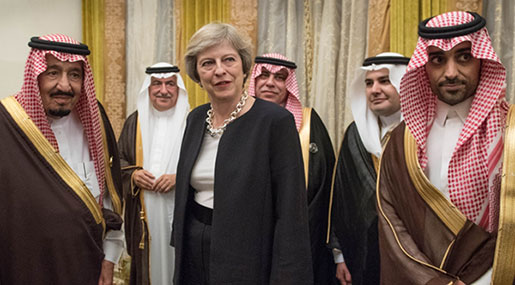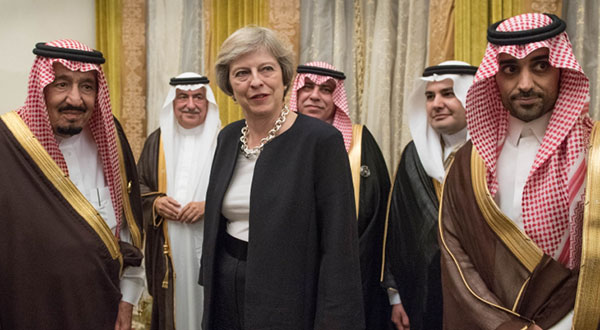
Saudi Is A Brutal, Extremist Dictatorship - So Why Are We Selling It Arms?

Caroline Lucas
With conflict in Yemen continuing, it's clear that we're failing to moderate the actions of "our despots".

This year, during Pride week, I noticed something curious on top of the Ministry of Defense just off Whitehall. At the tip of the building's flagpole hung the rainbow flag - a symbol of liberation for LGBTIQ people and, traditionally, a sign of defiance, too.
I was delighted to see it, and yet it also struck me as surprising that the governmental headquarters of our military would fly such a flag. It is more strikingly to me because of the closeness of our military establishment to regimes such as Saudi Arabia...
That relationship has been under the spotlight recently. Ministers writhed and squirmed to avoid making public a report that's widely expected to reveal that funding for extremism in Britain has come from Saudi Arabia. The pressure peaked last week, after a series of parliamentary questions I tabled, when survivors of 9/11 wrote to Theresa May asking her to make the report public. At the final PMQs of the parliamentary term last week, I again pressed May on the issue, but like so many prime ministers before her, she brushed aside my questioning on the link between British arms sales and the refusal to expose information that might embarrass the Riyadh regime.
The British government's cozy relationship with Riyadh and our habit of selling weapons to authoritarian regimes is "justified" in a number of ways. Firstly, ministers like to repeat familiar lines about protecting British industry, suggesting that the military industrial complex is central to our country's economic success.
It is true to say that we make a lot of money from selling weapons to Saudi Arabia - indeed figures released over the weekend by the Campaign Against Arms Trade revealed that the government authorized exports including £263m-worth of combat aircraft components to the Saudi air force, and £4m of bombs and missiles in the six months from October 2016.
Though those numbers are high, arms exports is not a jobs-rich industry and only 0.2 per cent of the British workforce is actually employed in the sector. And let's just be clear - there simply is no moral justification for employing people to build bombs which are likely to be used to slaughter civilians.
Ministers also justify friendship and arms sales to dictators as part of a foreign policy strategy. They may be despots, but they are "our despots". The truth, however, is that such deals simply aren't necessary for a relationship of equals. As my colleague Baroness Jones said recently in the House of Lords:
"As a politician, I understand that we sometimes have to work with some very unpleasant people and we have to sit down with them and negotiate with them. We might loathe them, but we have to keep a dialogue going. However, we do not have to sell them arms. Saudi Arabia is a brutal dictatorship. It is one of the world's worst Governments in terms of human rights abuses. We should not be selling it arms."
With Saudi Arabia's offensive against targets in Yemen continuing, and with UN experts saying the attacks are breaching international law, it's clear that we're failing to moderate the actions of "our despots".
The government's intransigence on this issue - despite the overwhelming moral argument - is astonishing. But it appears that the tide may be turning. In a recent survey, a significant majority of the public backed a ban on arms sales to Saudi Arabia and just this weekend the Mayor of London denounced the arms fair planned in the capital later this year. When the government refused to make the terror funding report public, there was near-universal condemnation from the opposition parties. On this issue, like so many others, the Tories are increasingly isolated and potentially weak.
The arms industry exists at the nexus between our country's industrial and foreign policies. To change course we need to accept a different direction in both policy areas. That's why I believe that we should accompany the end of arms exports to repressive regimes with a 21st century industrial policy which turns jobs in the industry into employment for the future. Imagine if the expertise of those currently building components for Saudi weaponry was turned towards finding solutions for the greatest foreign policy challenge we face: climate change.
The future of the British military industrial establishment's iron grip over government is now in question, and the answers we find will define this country for a generation. Do we stamp our influence on the world by putting our arm around the head-choppers of Riyadh and elsewhere, or do we forge a genuinely independent foreign policy that projects peace around the world - and puts the safety of British people at its core?
Source: NewStatesman.com, Edited by website team
Comments



